- Comics
- Comics Reviews
- Manga
- Comics Reviews
- European Comics
- News
- Comics News
- Press Releases
- Columns
- Spotlight
- Digital Comics
- Webcomics
- Cult Favorite
- Back Issues
- Webcomics
- Movies
- Toys
- Store
- More
- About
By Geoff Hoppe
November 11, 2006 - 21:43
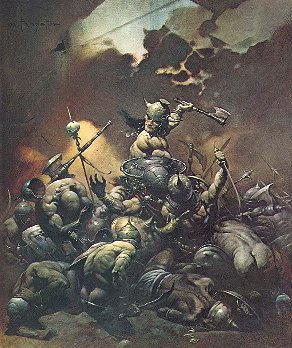 |
| Frank Frazetta's Conan |
This memorable experience was my indirect introduction to the barbarian king of Aquilonia, the corsair named Amra, the youth who sacked Venarium, the jet-maned, panther quick swordsman, and the scourge of Thoth-Amon. He is best known, however, by the birth name given to him on a battlefield in the "grim, grey hills of Cimmeria": Conan.
In Viking mythology, the frost-giant Ymir emerged full-formed from the hazy chaos of eternity. In similar fashion, Conan the Cimmerian—"black haired, sullen eyed, sword in hand"—emerged, full-formed, from the mind of Texan pulp-writer Robert E. Howard in the 30s.
Howard's descriptions of Conan's creation do not describe careful planning, numerous drafts, and various character sketches that refined a rough idea into a finished product. Conan sprung, full-formed, from Howard's mind:
Conan simply grew up in my mind a few years ago when I was stopping in
a little border town on the lower
This is not to say Conan was not inspired by other sources. Howard had amassed a lifetime of experiences by the time he sold his first story at nineteen. He had moved frequently in childhood, completed high school, and held several jobs. Conan drew on the countless personalities Howard had encountered. In one letter to a friend, he said:
He (Conan) is simply a combination of a number of men I have known and
I think that's why he seemed to step fullgrown into my consciousness when I wrote the first yarn of the series. Some mechanism in my sub consciousness took the dominant characteristics of various prizefighters, gunmen, bootleggers, oil field bullies, gamblers and honest workmen I had come in contact with, and combining them all, produced the amalgamation I call Conan the Cimmerian.
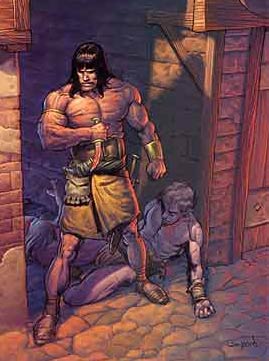 |
| Cary Nord's depiction of the Cimmerian thief |
Conan is the antithesis of the civilized man. Like many other authors of his day, Howard obsessed about the limitations of civilized life. The same concern (in different form) is present in Jack London's angry socialism, or Ernest Hemingway's desire for adventure and discovery. One way to "read" Robert Howard is as one member of a brotherhood of very malcontented, very masculine, early twentieth century authors. The source of the malaise these authors' work sought to combat is a different question entirely. Also interestingly, Howard and Hemingway committed suicide, and it's hotly debated whether Jack London's death was self-inflicted.
Out of the age undreamed of and into the twenty-first century
Today, the phrase "pulp fiction" brings to mind a Quentin Tarantino movie, rather than a literary sub-genre. There were plenty of "pulp" magazines in the 20s and 30s, many of them unsuccessful. There were also hordes of writers, stories, and characters in these publications. Conan has outlasted other popular pulp characters like Doc Savage and the Shadow. Why is this?
The easy answer: he's had more exposure.
Conan the Barbarian was one of Marvel Comics' flagship titles for about twenty years. Artists from Barry Windsor-Smith to Jim Lee were involved in the series in some fashion over the years. Comics legend Sal Buscema was the series' first writer. Attempts to bring characters like Doc Savage and the Shadow into comics were comparative failures.
Any discussion of Conan must acknowledge Frank Frazetta. Frank Frazetta painted the covers for the Conan paperbacks adapted and edited (some might say butchered) by L. Sprague DeCamp and Lin Carter in the ‘60s and ‘70s. Frazetta's first Conan gig was the cover illustration for the 1966 Lancer/Ace edition of
Conan the Adventurer. People bought the paperback for its cover alone. Frazetta revolutionized the way people imagined Conan. Before Frazetta, attempts to illustrate Conan were often unintentionally comic. Frazetta captured the raw, amoral, primitive energy that characterized the Cimmerian swordsman. Frazetta is also responsible for the titanic frame and long black hair prevalent in the Conan images of today. From Barry Windsor-Smith to Cary Nord, all modern Conans stem from Frazetta. One could even argue that producers of the Conan movie would have selected a less muscular actor, had it not been for Frazetta's iconic depiction.
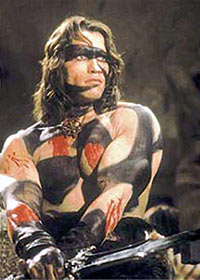 |
| Arnold Schwarzenegger as Conan |
The story butchers some elements of the Conan mythology, but successfully adapts others. In the movie, Conan is sold into slavery as a boy (never happened in the stories), becomes a gladiator (never happened in the stories), and encounters an ancient, mystic bad guy with magical powers (a frequent theme in the stories). Schwarzenegger is physically imposing, but fails to portray Conan's psychological complexities as Howard captured them. The opening credits say "inspired by the work of Robert E. Howard" for a reason. To be fair, the movie is extremely well done, and puts many other (even contemporary) fantasy films to shame. To direct an accurate, stand-alone Conan yarn would have been financial suicide, and probably couldn't have made it past early 80s MPAA standards.
Another Conan movie,
Conan the Destroyer, was made in 1984.
Destroyer was horrendous. Unlike the first movie, it lacked any textual elements in the plot, and introduces a rash of dull and uninspired characters. Following
Destroyer, there were several failed attempts to bring Conan to tv. A quickly cancelled cartoon series and a dreadful live-action show generated zero interest in the character.
In 2004, Dark Horse Comics, producer of such hits as
The Eternal Primitive
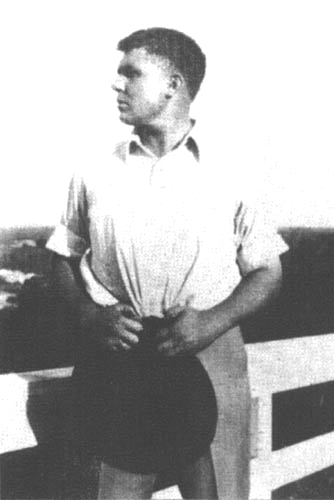 |
| Robert E. Howard, creator of Conan |
The first is Conan's surroundings. The Hyborian Age is the most magnificent playing field ever constructed by a fantasy author. Monsters, gods, cultists, warriors, wanderers and supple young women abound. Dilapidated, maleficent ruins are in abundant supply. Other fantastic realms are enjoyable to read about, but not as much
fun for a reader to imagine oneself in. Narnia, for instance, is beautiful, but full of theological realities and moral responsibilities. Middle Earth, the most brilliant of modern fantasy realms, is perfectly designed, perhaps
too well designed: everything has a place (even lowly Gollum, inadvertently pulling the Ring into the fires of
The second explanation for Conan's longevity is his brilliantly archetypal design. In the early twentieth century, a Texan storyteller whose education stopped at high school somehow tapped into a primal well of the human subconscious. Conan embodies the will to power, the urge to survive, the mix of cynicism, hope and glory-lust that motivates many men, but few will admit to. If Conan has a cousin in the history of literature, it's Don Juan. Both men are forces of nature personified. The key difference is that Don Juan's principle interest is sex, but Conan's is power and glory (Conan also has a distinctive set of ethics—Don Juan has none). Howard's recounting of Conan's creation sounds like a textbook description of the collective unconscious, a psychological concept pioneered by Swiss psychologist
C.G. Jung. In Jung's psychology, the collective unconscious is a murky haze located beyond the borders of consciousness. Compare this to Howard's statement that Conan "
stalked full grown out of oblivion,"
and the reflection that Conan was an amalgamation of "the dominant characteristics of
various prizefighters, gunmen, bootleggers, oil field bullies, gamblers and honest workmen" Howard had met.
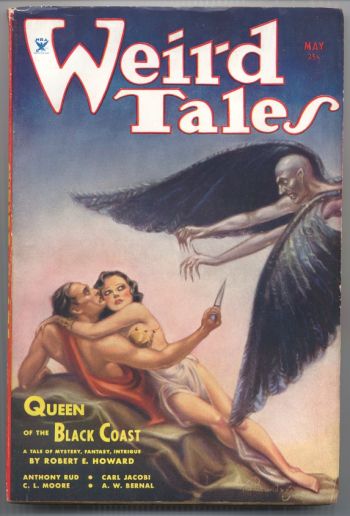 |
| an original image of Conan |
Can Howard be called a great writer? That depends on how "great writer" is defined. The phrase is brandished frequently, with little thought given to its meaning. Many deemed "great writers" may have little technical skill, but tremendous imagination as storytellers. Other authors have great technical abilities, but feeble imaginations. Very few writers have both. Robert E. Howard lacked the charm or technical skill of Somerset Maugham, or the genius for language and form of James Joyce, but he had an imagination raw and powerful enough to create myth in an age of ennui. While his expatriate contemporaries left in groaning boatloads for